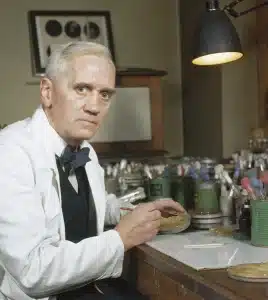
Alexander Fleming
«Alexander Fleming was a Scottish physician who discovered penicillin in 1928. Fleming had been studying bacterial cultures when he found the mould leading to penicillin».
- FORM
| Affirmative | I had been learning German for three years.
We had been practising Yoga twice a week |
| Negative | He had not (hadn’t) been learning German.
She had not (hadn’t ) been learning the language |
| Interrogative | Had he been learning German?
Who had been painting this room? He is doing a terrible job! |
2. USE
A. We use the past perfect continuous to talk about an action or situation that was happening in the past before another action or time:
- I had been learning German for three years when I went to live in Berlin.
- How long had you been planning your new business before you started it?
B. We usually introduce the second action with «when»:
He’d been taking cooking lessons for four years when he finally got a job as a Chef. The continuous action can stop when the second action happens (a) or it can continue (b).
(a) The band had been playing for half an hour when suddenly the energy went out. (stops).
(b) Robert had been working there for two years when he was promoted to a better position. ( doesn’t stop).
3. Compare Past Perfect Continuous with other forms.
A – Notice the difference between the past continuous and the past perfect continuous:
— When I arrived home, Homer was washing the dishes. (He was still washing it.)
— When I arrived home, Homer had been washing the dishes, and he was drying them. (He was no longer
washing the dishes.)
B – The differences between the past perfect simple and continuous are similar to the
differences between the present perfect simple and continuous.
— I called Paul after I’d had my dinner. (The dinner was finished.)
— I called Paul before I’d been cooking my dinner for one hour. (The dinner wasn’t finished.)
C – We use the past perfect simple with a number or amount:
I called Paul after I’d done a couple of homework.
I gave up after I’d tried three times to resolve the maths problem.
— We do not usually use the past perfect continuous with state verbs.